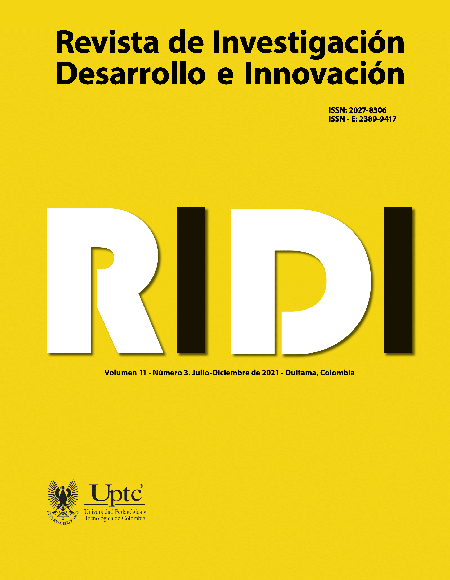Relationship between innovation and growth of sme in the food and beverage industry of Bogota, Colombia

Abstract
The objective of the work is to determine the relationship between innovation and business growth of SMEs in the food and beverage sector of the city of Bogotá (Colombia) in the period 2007-2016. To do this, an OLS estimate was made to a large and homogeneous sample of companies in this sector, using statistical information from the National Administrative Department of Statistics (2017, 2018). The results show that there is a significant and positive relationship between innovation and business growth, in which the size of the organizations is also a determining factor. As an additional contribution, this research goes beyond analyzing the traditional relationship between innovation and growth, and also considers the links of the innovative strategy with the generation of added value and with the greater productivity of the analyzed organizations, which allows reiterating the need to promote such strategies that enhance the development of the sector.
Keywords
growth of firm, food and beverage industry, innovation, SME
Author Biography
Fernán Ignacio Díaz-Hincapié
Ingeniero Mecánico, Magíster en Administración
Zuray Andrea Melgarejo-Molina
Contadora Pública, Doctora en Sistemas Flexibles de Dirección de Empresas
Mary Analí Vera-Colina
Contadora Pública, Doctora en Ciencias Económicas
References
- Ahn, S., Yoon, J., & Kim, Y. (2018). The innovation activities of small and medium-sized enterprises and their growth : quantile regression analysis and structural equation modeling. The Journal of Technology Transfer, 43 (2), 316–342. https://doi.org/10.1007/s10961-017-9570-3
- Arbeláez, M. A., & Torrado, M. P. (2011). Innovation, R & D Investment and Productivity in Colombian Firms. Inter-American Development Bank.
- Beltran, A., & Pulido, B. (2012). Innovación : estrategia que contribuye a asegurar crecimiento y desarrollo en micro, pequeñas y medianas empresas en Colombia. Sotavento M.B.A., 19, 104–113.
- Bernal, C. A., Fracica, G., & Frost, J. S. (2012). Análisis de la relación entre la innovación y la gestión del conocimiento con la competitividad empresarial en una muestra de empresas en la ciudad de Bogotá. Estudios Gerenciales, 28, 303–315.
- Busom, I., & Vélez-Ospina, J. A. (2017). Innovation, Public Support, and Productivity in Colombia. A Cross-industry Comparison. World Development, 99, 75–94. https://doi.org/10.1016/j.worlddev.2017.07.005
- Ciftci, I., Tatoglu, E., Wood, G., Demirbag, M., & Zaim, S. (2019). Corporate governance and firm performance in emerging markets: Evidence from Turkey. International Business Review, 28, 90-103. https://doi.org/10.1016/j.ibusrev.2018.08.004
- Coad, A., Pellegrino, G., & Savona, M. (2016). Barriers to innovation and firm productivity. Economics of Innovation and New Technology, 25 (3), 321–334. https://doi.org/10.1080/10438599.2015.1076193
- Coad, A., Segarra, A., & Teruel, M. (2016). Innovation and firm growth : Does firm age play a role ?, 45, 387–400.
- Crespi, G., & Zuniga, P. (2012). Innovation and Productivity: Evidence from Six Latin American Countries. World Development, 40(2), 273–290. https://doi.org/10.1016/j.worlddev.2011.07.010
- Crowley, F., & McCann, P. (2018). Firm innovation and productivity in Europe: evidence from innovation-driven and transition-driven economies. Applied Economics, 50 (11), 1203–1221. https://doi.org/10.1080/00036846.2017.1355543
- Daunfeldt, S., & Elert, N. (2013). When is Gibrat’s law a law?. Small Business Economics, 41 (1), 133–147. https://doi.org/10.1007/s11187-011-9404-x
- Departamento Administrativo Nacional de Estadística, DANE. (2017). Encuesta de Desarrollo e Innovación Tecnológica sector Industria Manufacturera (2015-2016). Boletín técnico (Vol. VIII). Bogotá.
- Departamento Administrativo Nacional de Estadística, DANE. (2018). Boletín técnico encuesta anual manufacturera. Bogotá.
- Ferrara, G. (2018). Innovation in Agro-Food: A Geographical Perspective. Journal of Food Products Marketing, 24 (1), 117–124. https://doi.org/10.1080/10454446.2017.1266554
- García, J., & Romero, E. (2012). Research , development , and firm growth . Empirical evidence from European top R & D spending firms. Research Policy, 41 (6), 1084–1092. https://doi.org/10.1016/j.respol.2012.03.017
- Gibrat, R. (1931). Les inegalites economiques; ap- plications: aux inegalite’s des richesses, a la con- centration des entreprises, aux populations des villes, aux statistiques des familles, etc., d’une loi nouvelle, la loi de l’effet proportionnel. (Librairie du Recueil Sirey, Ed.). Paris.
- Kato, E. (2019). Productividad e innovación en pequeñas y medianas empresas. Estudios Gerenciales, 35 (150), 38–46.
- Liao, S.-H., & Wu, C. (2010). System perspective of knowledge management, organizational learning, and organizational innovation. Expert Systems with Applications. https://doi.org/10.1016/j.eswa.2009.06.109
- Melgarejo, Z., & Simon, K. (2019). Desempeño empresarial y ciclo económico en la industria de alimentos y bebidas colombiana: una aproximación no paramétrica. Estudios Gerenciales, 35 (151), 190-202.
- Melgarejo, Z., Ciro, D., & Simon, K. (2019). Determinantes clave en el debate teórico sobre crecimiento empresarial. Criterio Libre, 17(31), 273–296.
- Melgarejo, Z., Ciro-Romero, D., & Simon-Elorz, K. (2021). Empresas de Alto Crecimiento de Colombia y España. Revista Dimensión Empresarial, 19 (1), 24-41.
- Naranjo, J., & Córdoba, J. (2017). Incidencia de la Inversión en Innovación en las Ventas de Productos Innovadores. Evidencia Empírica en Empresas Manufactureras de Colombia. Información Tecnológica, 28 (2), 153–166. https://doi.org/10.4067/S0718-07642017000200017
- Organización para la Cooperación y el Desarrollo Económico, OCDE. (2013). La Estrategia de Innovación de la OCDE. París. https://doi.org/10.1787/9789264080836-es
- Organización para la Cooperación y el Desarrollo Económico, OCDE. (2014). Estudios de la OCDE de las Políticas de Innovación: Colombia. https://doi.org/10.1787/9789264060906-es
- Organización para la Cooperación y el Desarrollo Económico, OCDE. (2015). The Innovation Imperative: Contributing to Productivity, Growth and Well-Being. París: OCDE. http://dx.doi.org/10.1787/9789264239814-en
- Polo, J., Ramos, J., Arrieta, A. A., & Ramirez, N. (2018). Impacto de la Innovación Sobre la Conducta Exportadora en el Sector de Alimentos y Bebidas de Colombia. Revista de Análisis Económico, 33 (Abril), 89–120.
- Rivera, J., & Ruiz, D. (2011). Análisis del desempeño financiero de empresas innovadoras del Sector Alimentos y Bebidas en Colombia. Pensamiento & Gestión, (31), 109–136.
- Ruiz, C. (1992). Las empresas micro, pequeñas y medianas: crecimiento con innovación Tecnológica. Comercio Exterior, 42 (2), 163–168.
- Santi, C., & Santoleri, P. (2017). Exploring the link between innovation and growth in Chilean firms. Small Business Economics, 49, 445–467. https://doi.org/10.1007/s11187-016-9836-4
- Sorescu, A. B., & Spanjol, J. (2008). Innovation’s Effect on Firm Value and Risk: Insights from Consumer Packaged Goods. Journal of Marketing, 72(2), 114–132. https://doi.org/10.1509/jmkg.72.2.114
- Spescha, A. & Woerter, M. (2019). Innovation and firm growth over the business cycle. Industry and Innovation, 26 (3), 321-347. https://doi.org/10.1080/13662716.2018.1431523